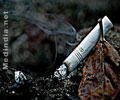Scientists have found that the first stools that a baby passes after being born can actually be used to determine how much their mother smoked, or if she was exposed to tobacco smoke during pregnancy.

Researchers measured tobacco smoke metabolites in meconium samples from 337 babies, finding that they correlated well with reported smoke exposure and other markers of tobacco smoke exposure.
Joe Braun, from the University of North Carolina-Chapel Hill, USA, worked with a team of researchers to carry out the study.
"Prenatal active and secondhand tobacco smoke exposure is a prevalent environmental exposure that is associated with adverse infant and childhood health outcomes. Biomarkers of exposure, like serum and meconium tobacco smoke metabolites, are useful to enhance the measurement of tobacco smoke exposure, which is often under-reported," he said.
The researchers found that tobacco smoke metabolites in meconium reflected the duration and intensity of gestational exposure to tobacco smoke.
Concentrations were higher and almost universally detected among infants born to active smokers compared to women with secondhand or no exposure.
Advertisement
The study appears in BioMed Central's open access journal Environmental Health.
Advertisement















